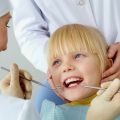Dentures
 Having a confident, healthy, beautiful smile is important to all patients, even those wearing dentures.
Having a confident, healthy, beautiful smile is important to all patients, even those wearing dentures.
Our practice offers personalized denture services that meet thee needs and comfort of all our patients. We know that all of our patients are unique so we create one-of-a-kind dentures that feel and look like natural teeth.
What are dentures?
Dentures are removable natural-looking replacement teeth. There are two types of dentures: full and partial.
- Full Dentures are given to patients when they have no natural teeth left. Conventional full dentures will be placed when all of the gum tissue has healed, which can take a few months. Immediate full dentures are placed immediately after the final teeth have been removed and can require frequent adjustments during the first couple of months of use.
- Partial Dentures are connected to a metal frame that is attached to your natural teeth and are used to fill in where natural teeth have been lost or removed. Partial dentures are also considered a removable alternative to bridges.
How do I know if dentures are the right choice for me?
Dentures are not for everyone. If you are interested in learning more about dentures and would like to know if they are the right choice for you, please schedule a visit. Our office would be more than happy to answer any questions you might have, and can determine the best course for you.
Caring for your dentures
Just like natural teeth, dentures, require daily maintenance to stay clean and keep bacteria from growing inside your mouth. Keep your dentures clean in order to keep your smile healthy:
- When handling your dentures, stand over a clean, folded towel or a sink full of water. This way, if you accidentally drop your dentures, they are less likely to break.
- Your dentures are not immune from plaque and tartar build-up, so it's important that you brush your dentures every day. To brush your dentures, use a soft-bristled brush and gently brush the surfaces of the dentures, being careful not to break or bend the plastic. Between brushings, it's important to rinse your dentures after each meal.
- Use a gentle cleanser to clean your dentures. Many toothpastes, household cleaners, and mouthwashes can be too hard on your dentures, so it is recommended that you use a mild hand or dish soap to get your dentures clean. Be sure to check for the American Dental Association (ADA) seal of approval to choose products that are safe for your dentures, or ask your dentist about which products may be best for you.
- When you are not wearing your dentures, they need to be kept moist. Dentures that are not kept in a denture cleaning solution or in water can dry out, lose their shape, or even crack and break. Certain styles of dentures require certain soaking solutions, so be sure to ask your dentist which solution is best for you.
- Even if you have a full set of dentures, it's important to keep your gums and tongue clean. Be sure to use a soft-bristled brush to gently clean your gums and tongue every day.
If an accident does occur and your dentures do break, please contact our office to schedule a visit as soon as possible. Broken dentures can cause irritation to your gums and mouth. Also, remember to keep up with your regular checkups to insure that your smile stays healthy.
Other products and services:
Products and Services of other companies:
- +1 (214) 221-4867
- 2401 S. Stemmons Fwy #1258 Lewisville, TX 75067
- www.mypeppermintdental.com/












